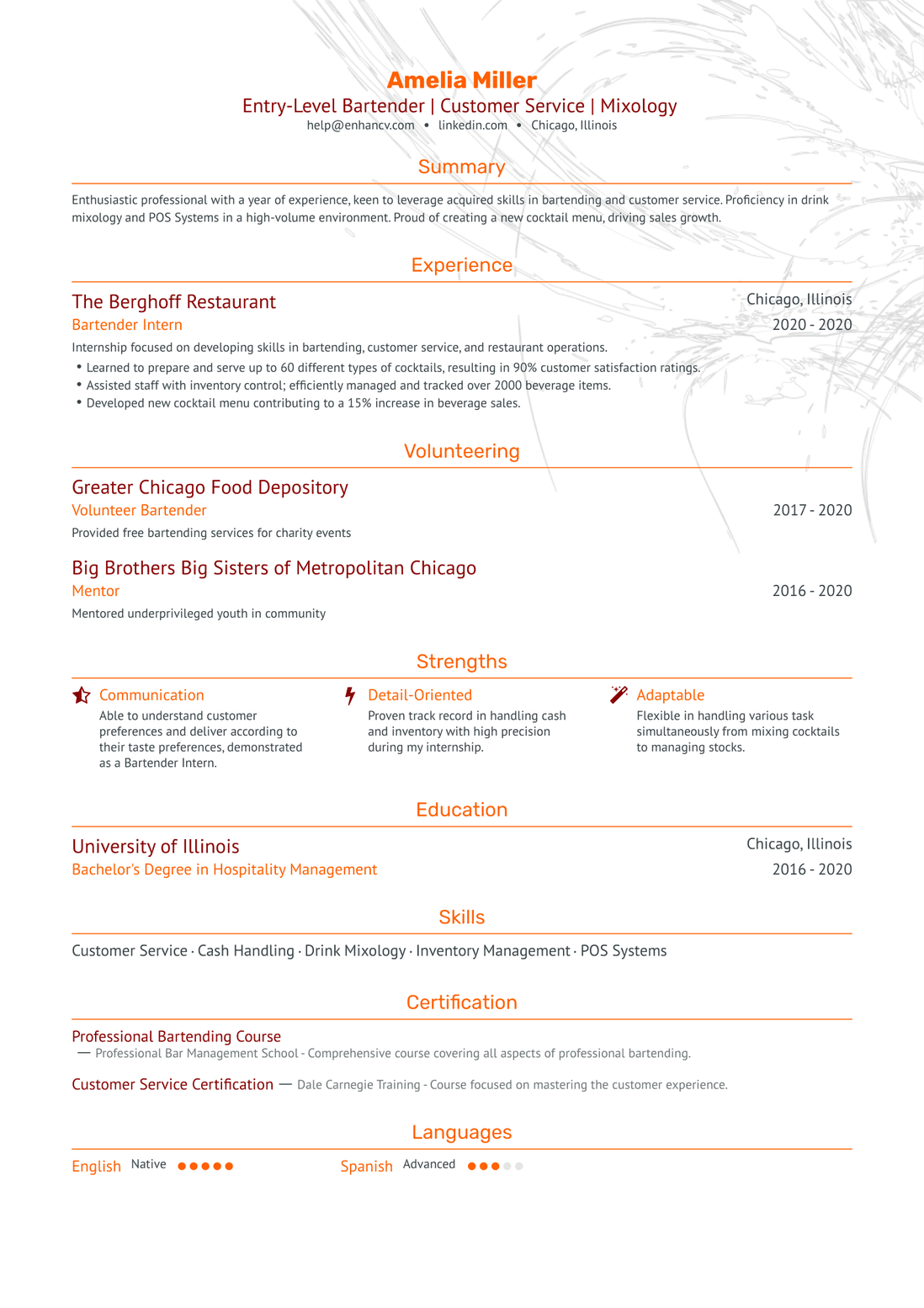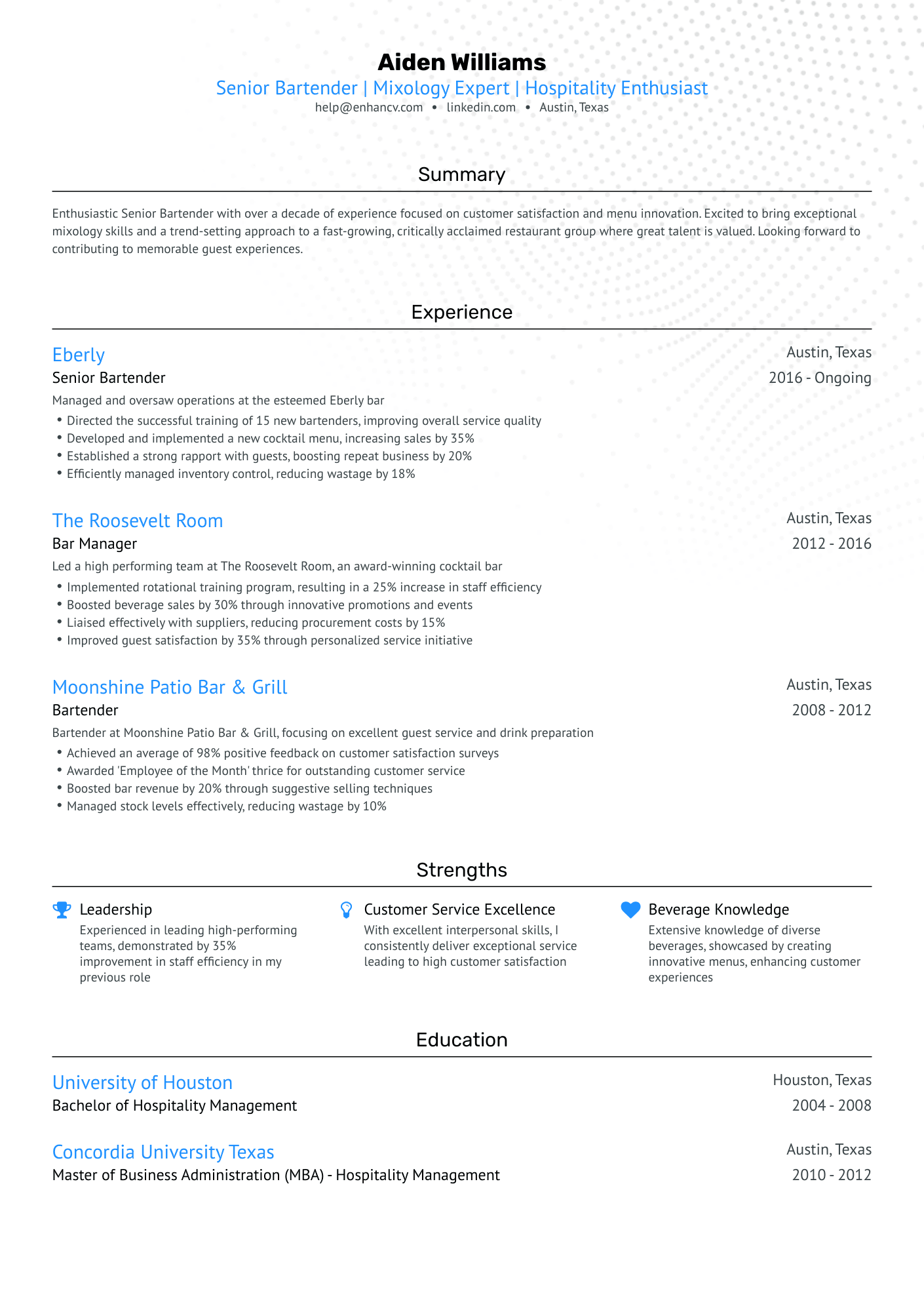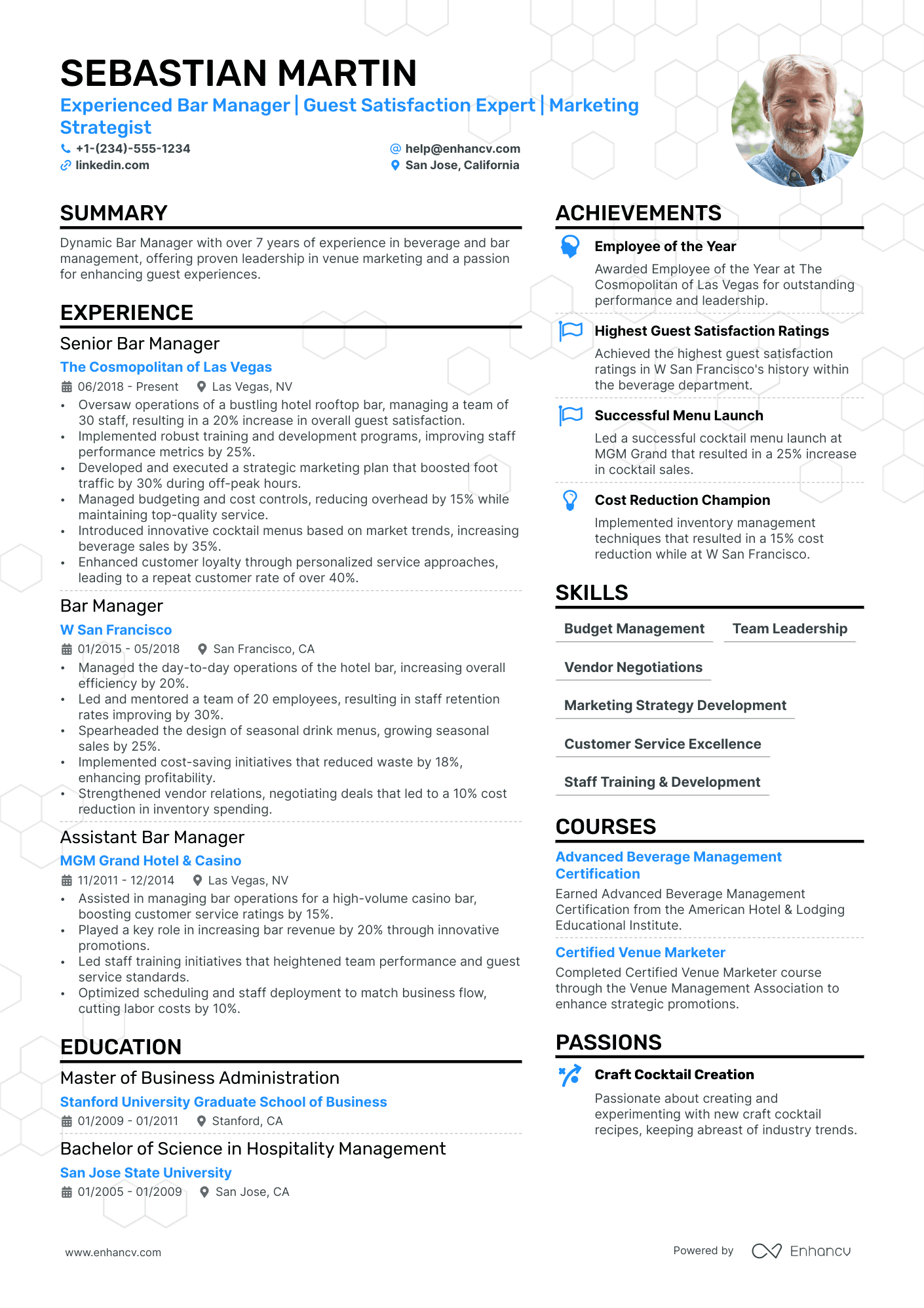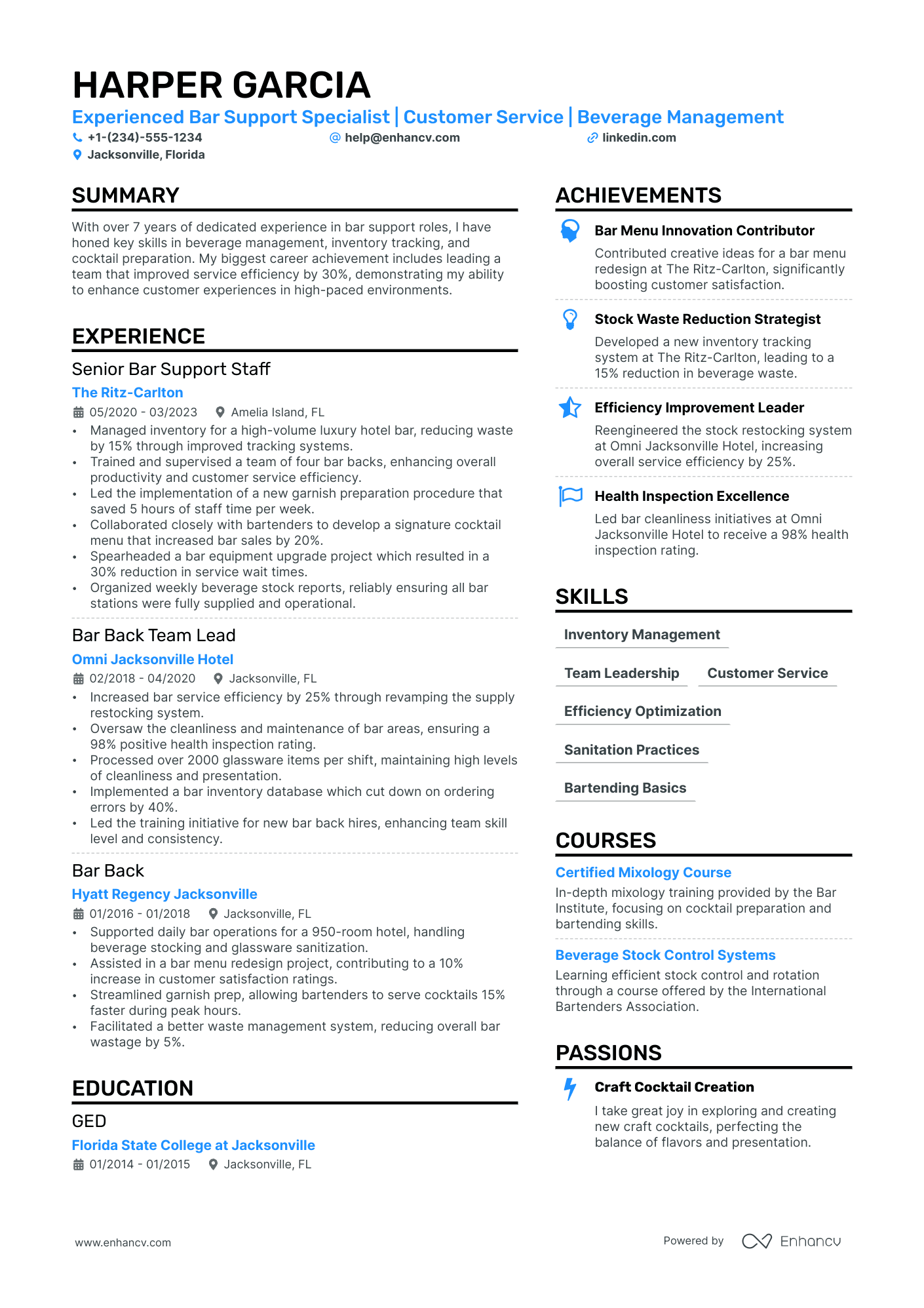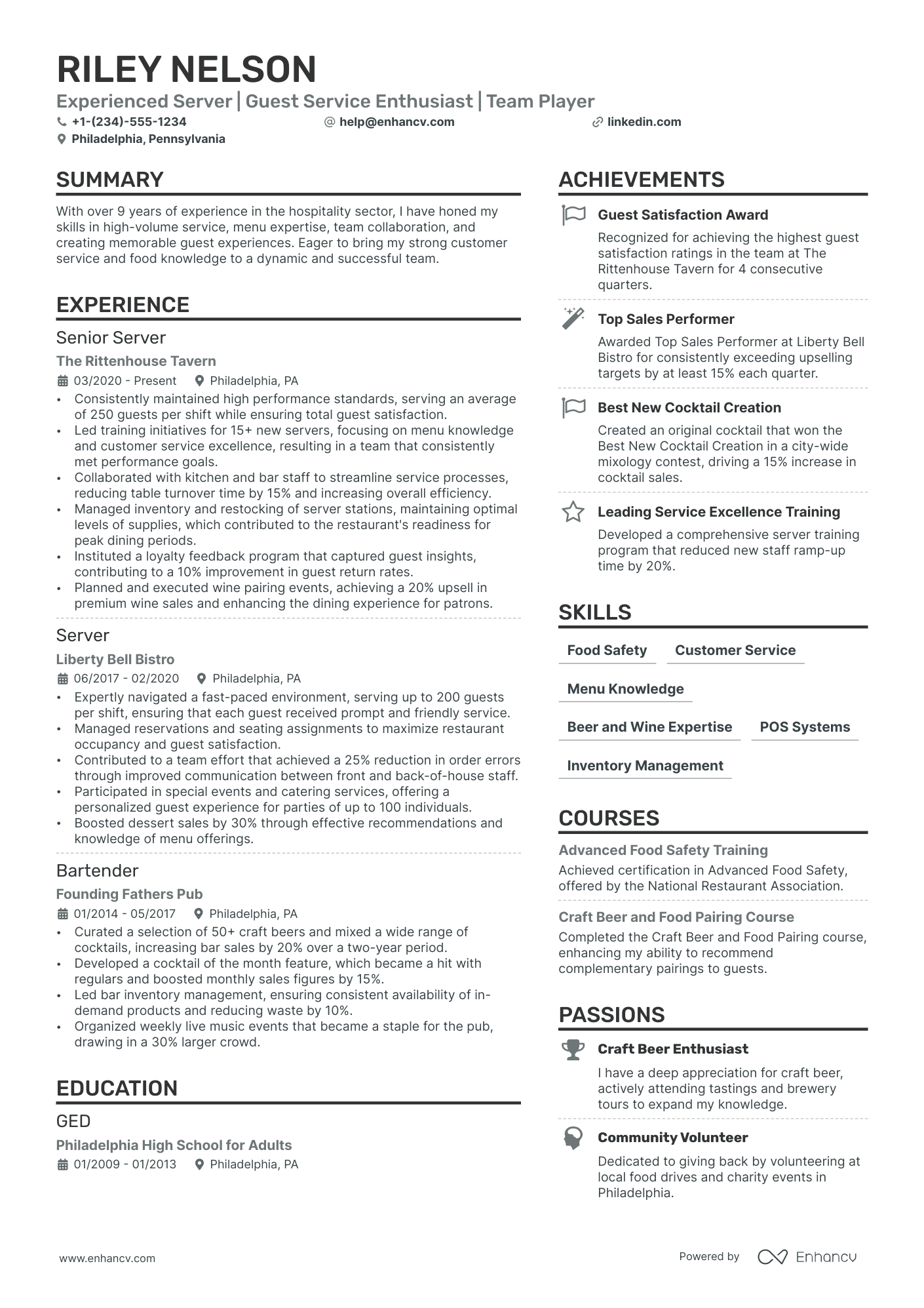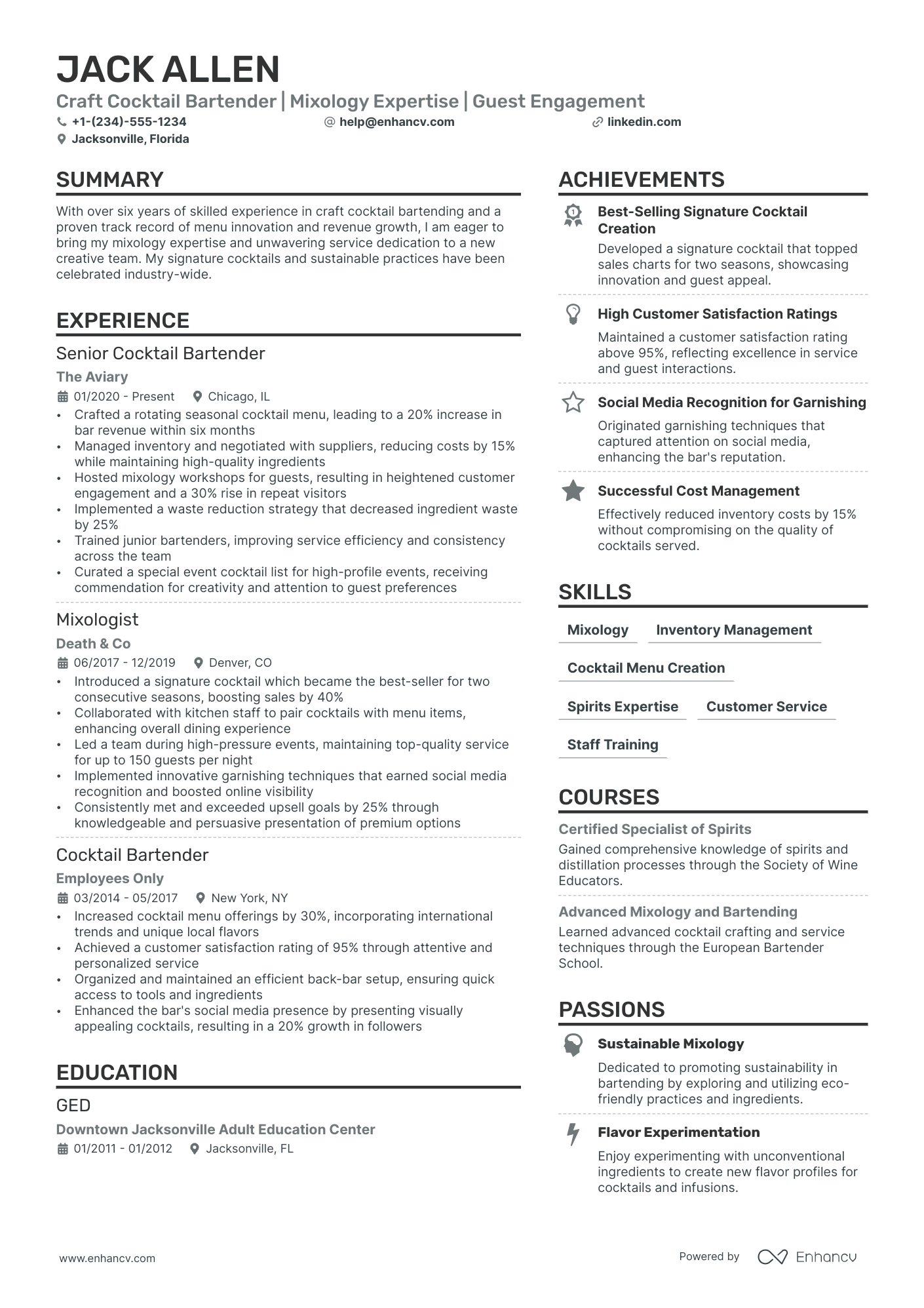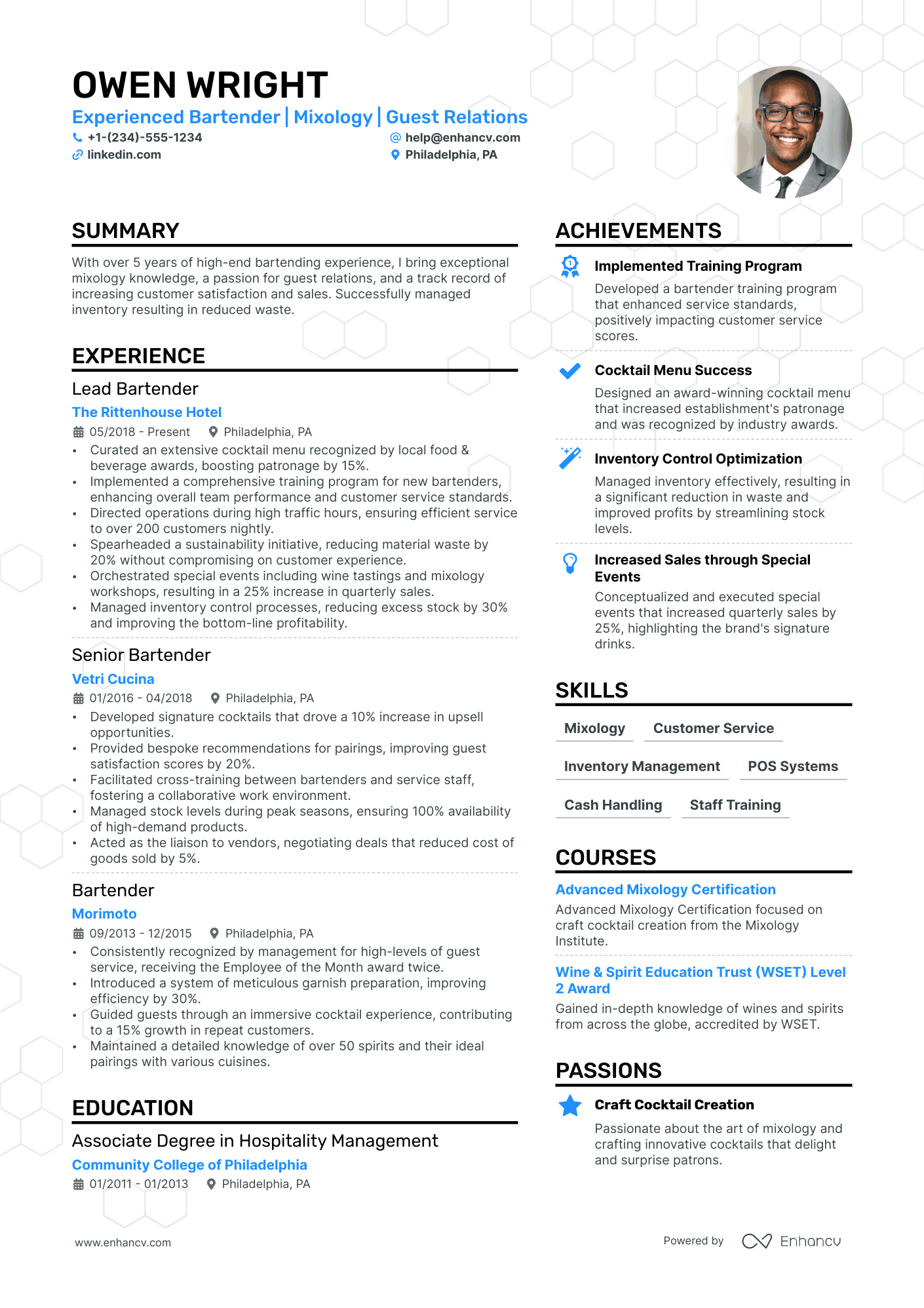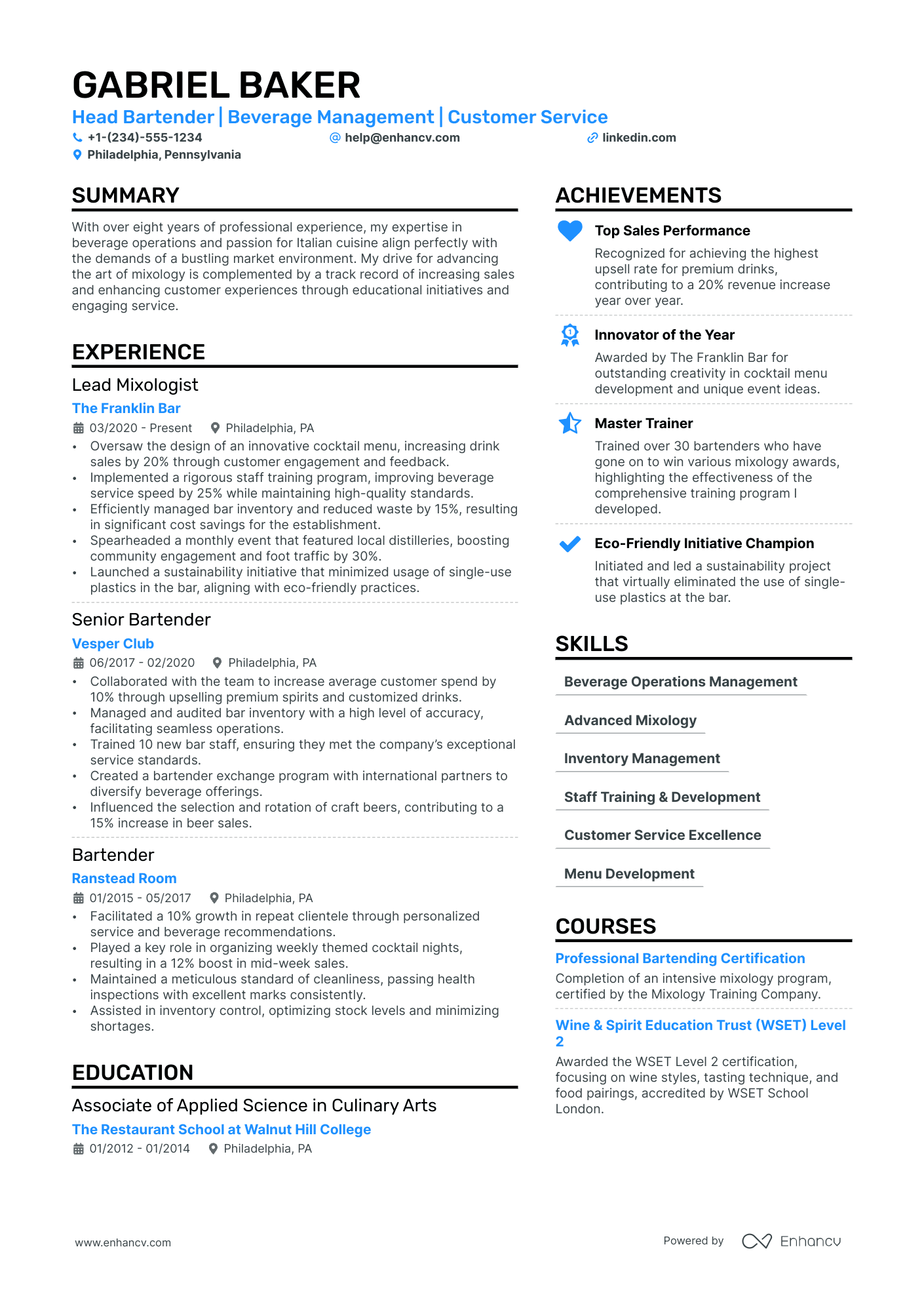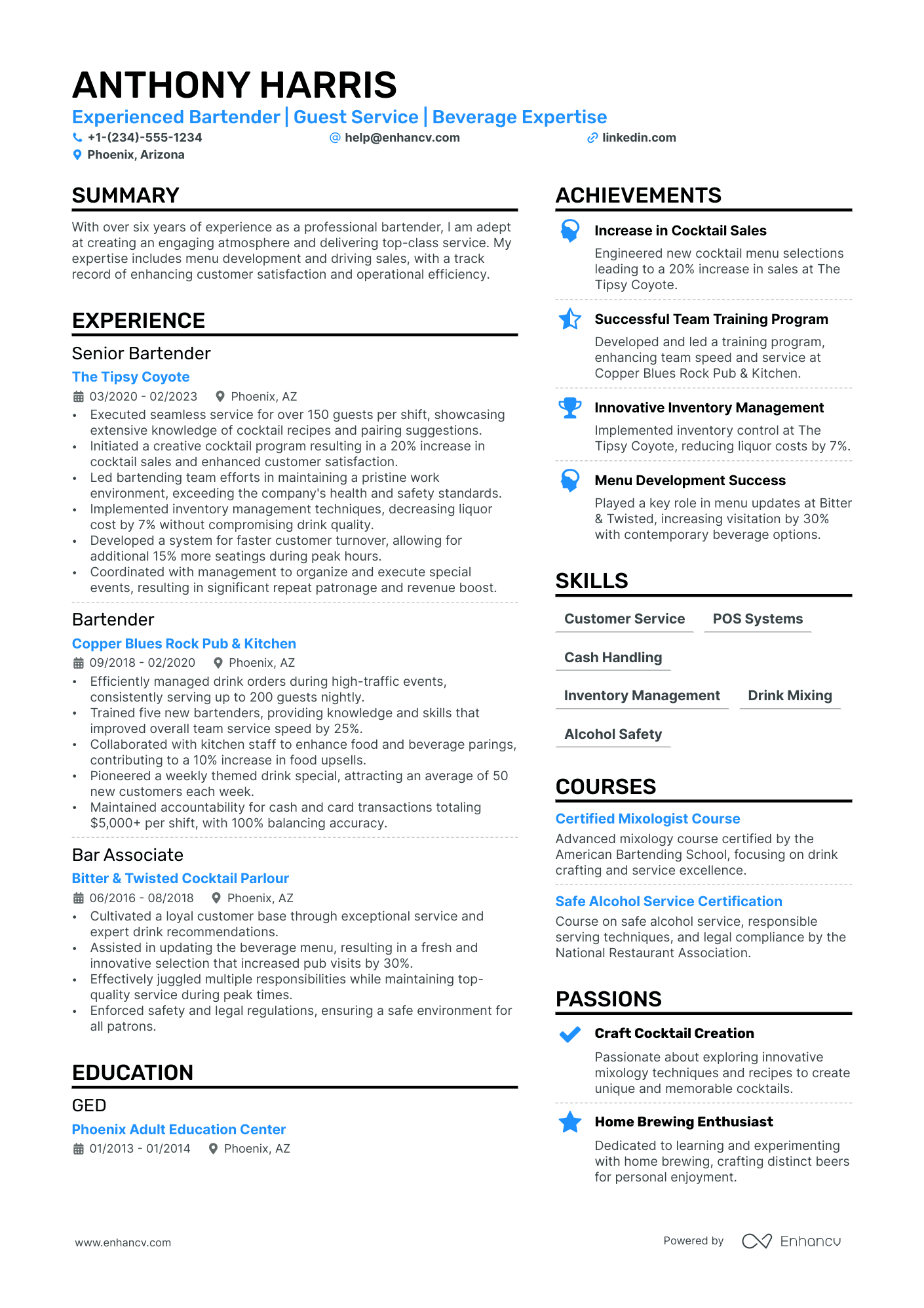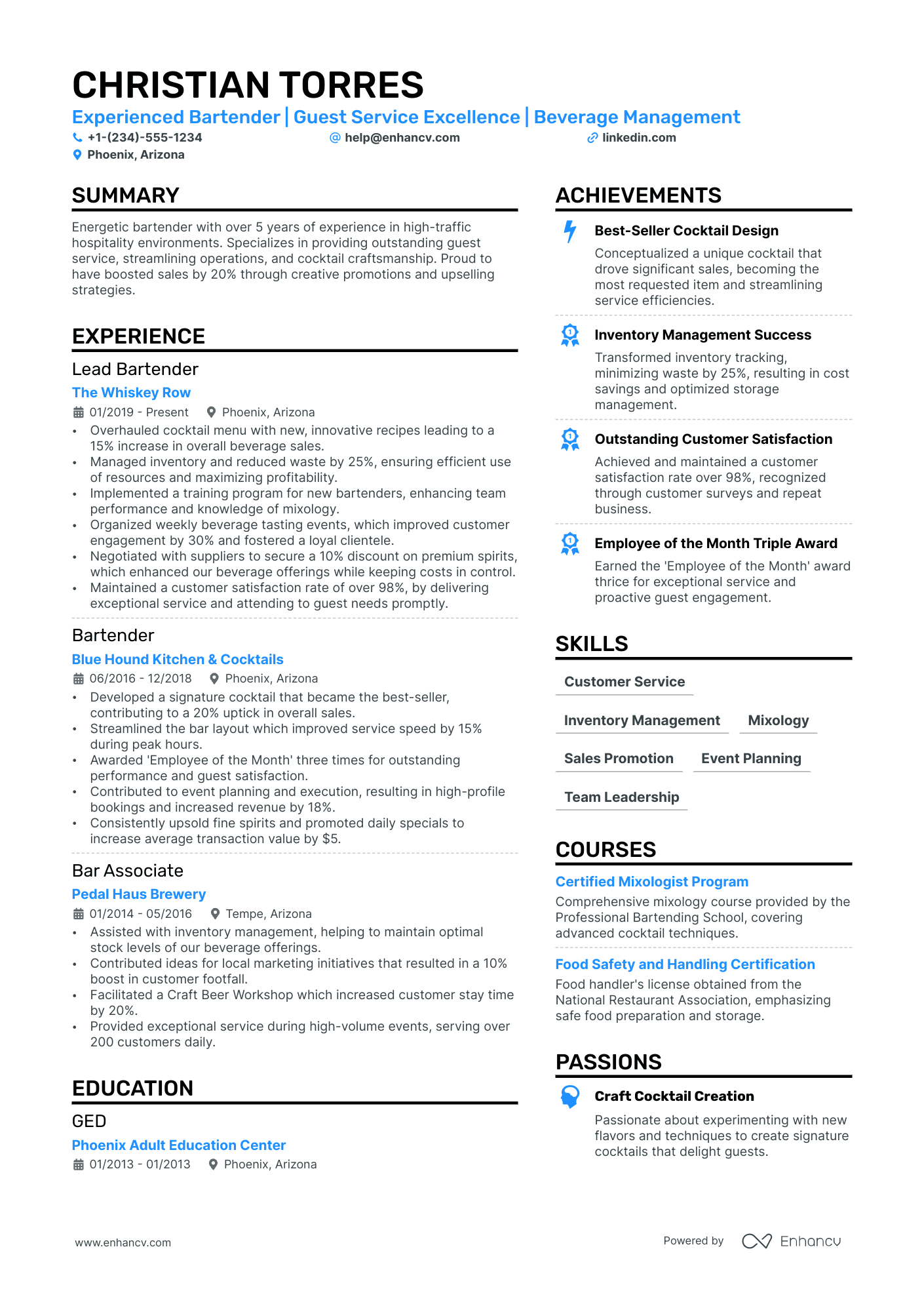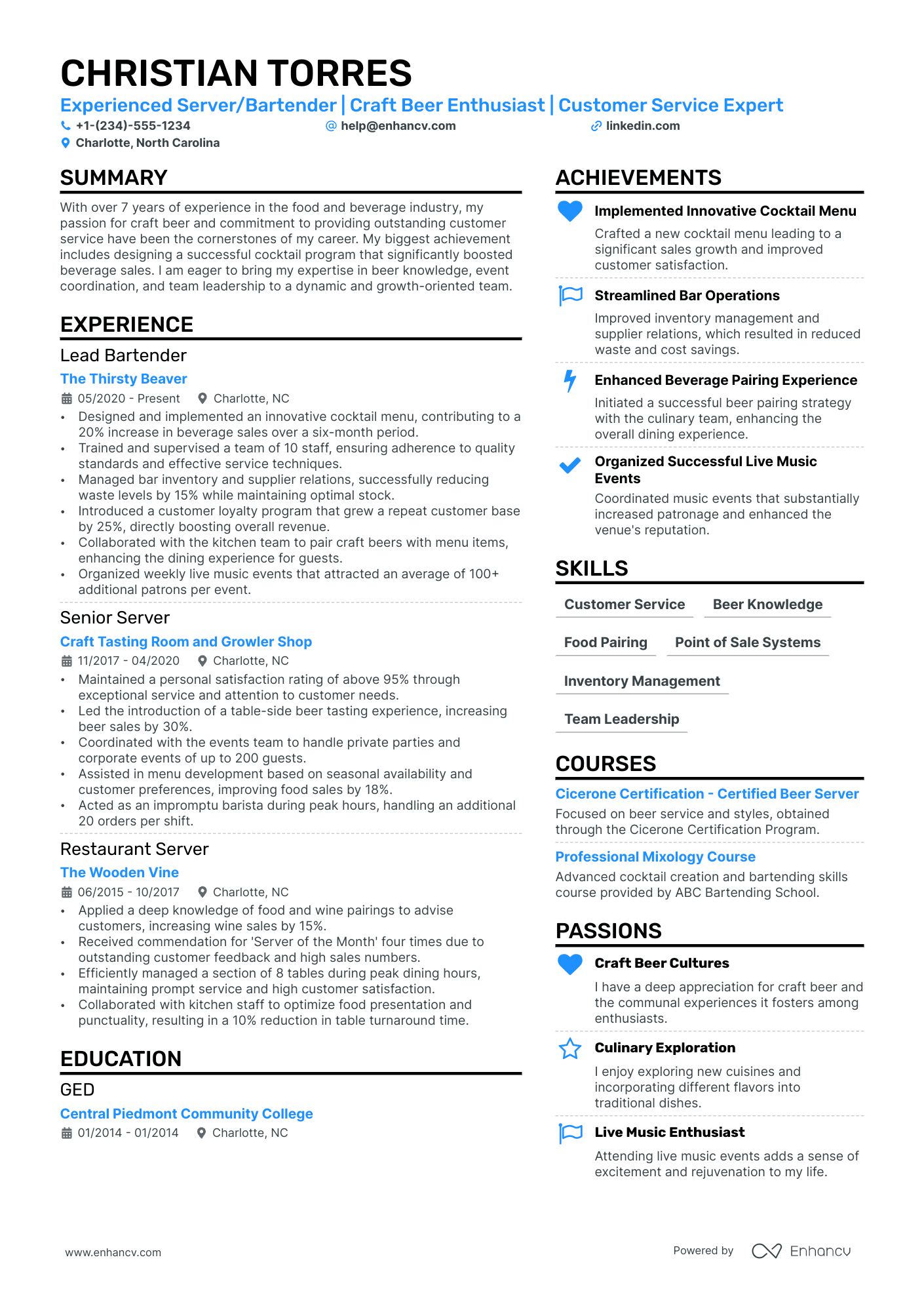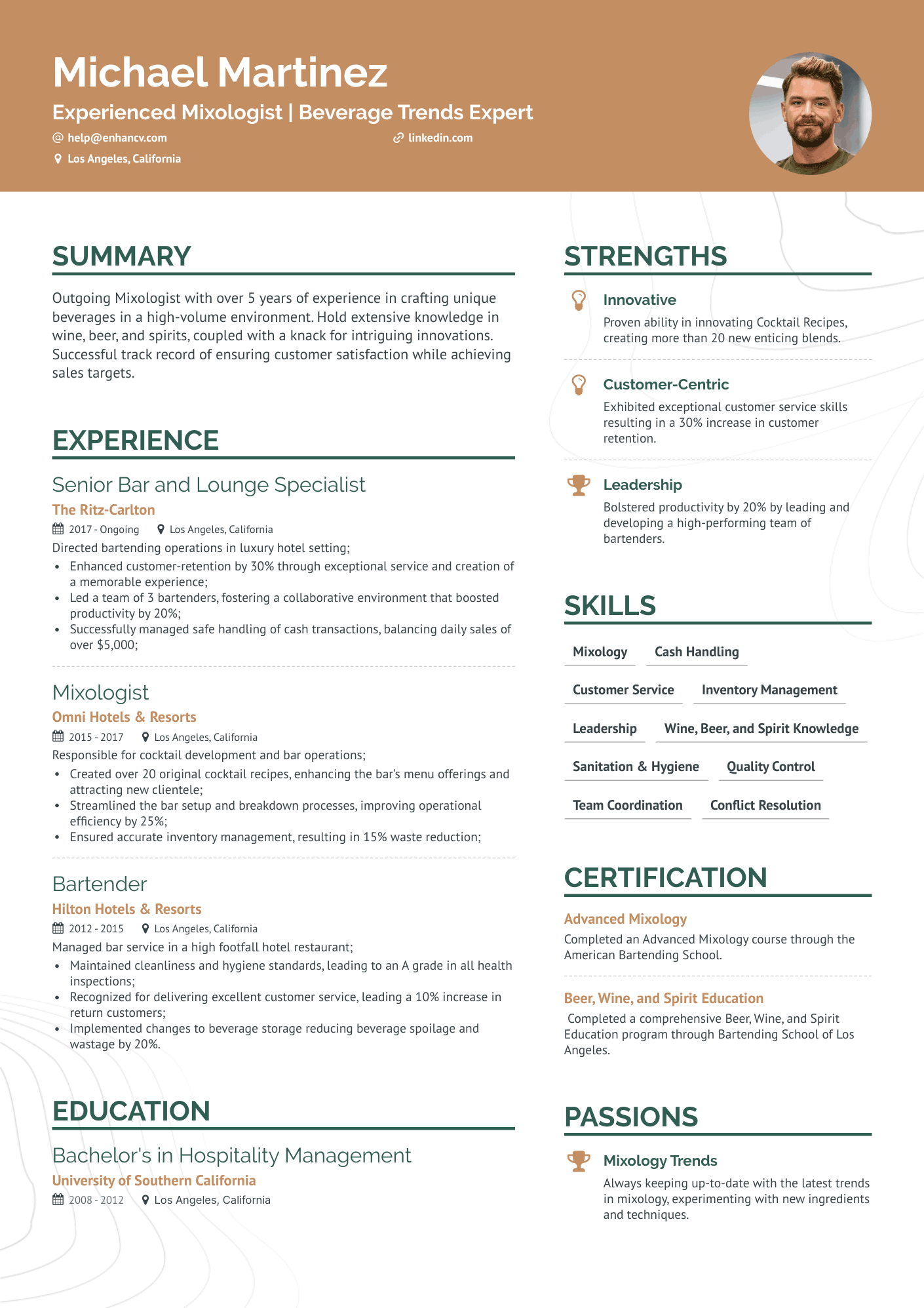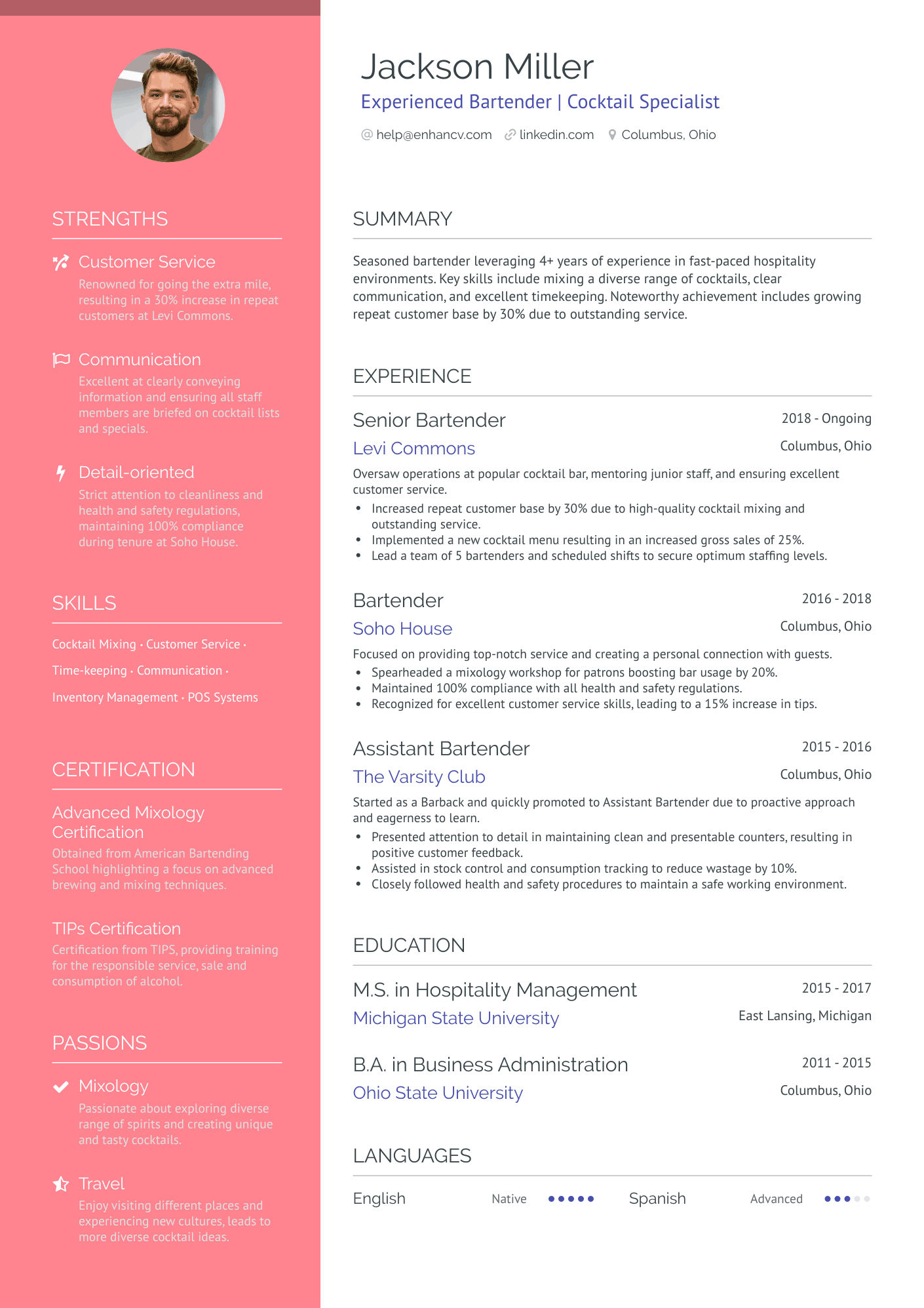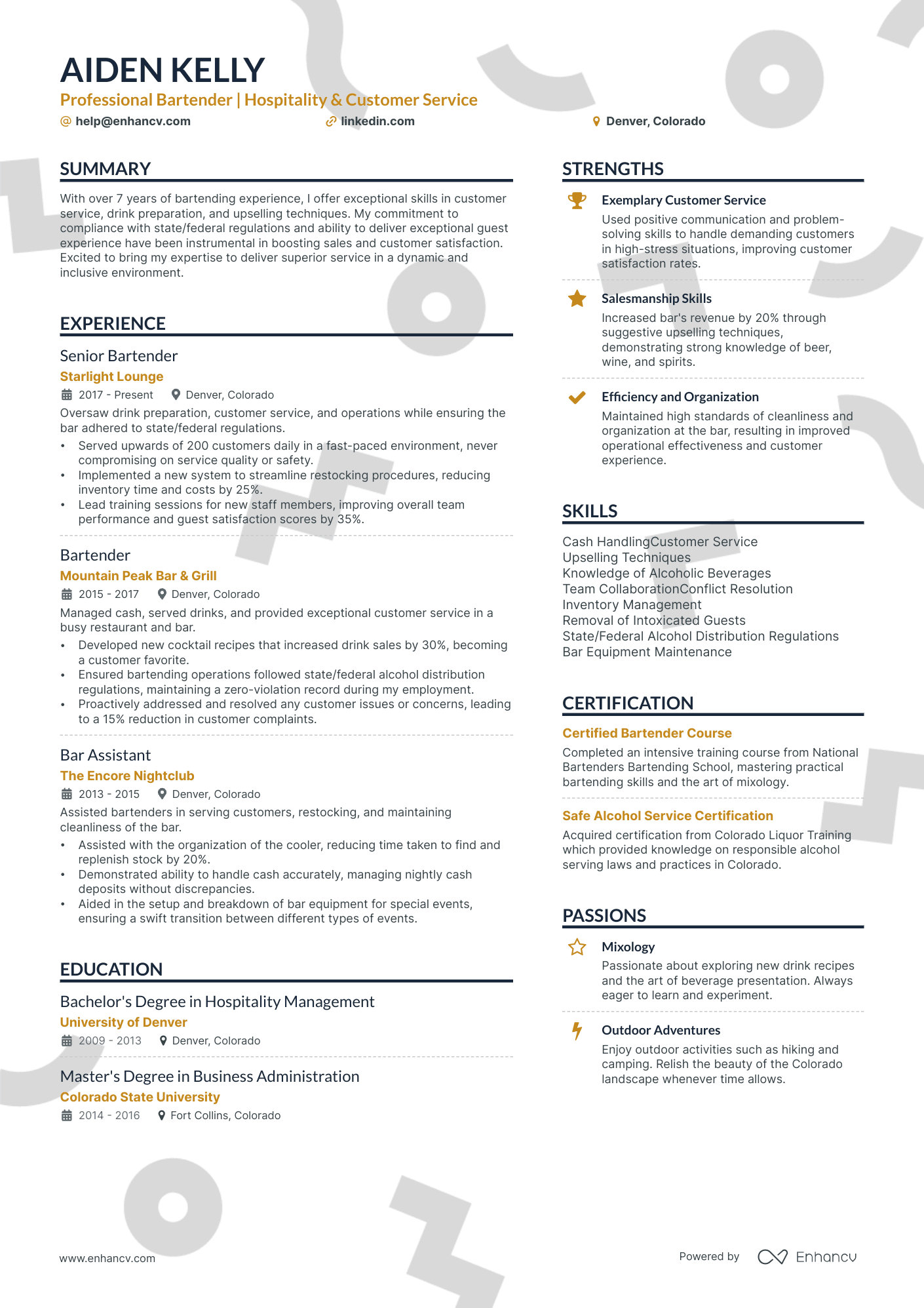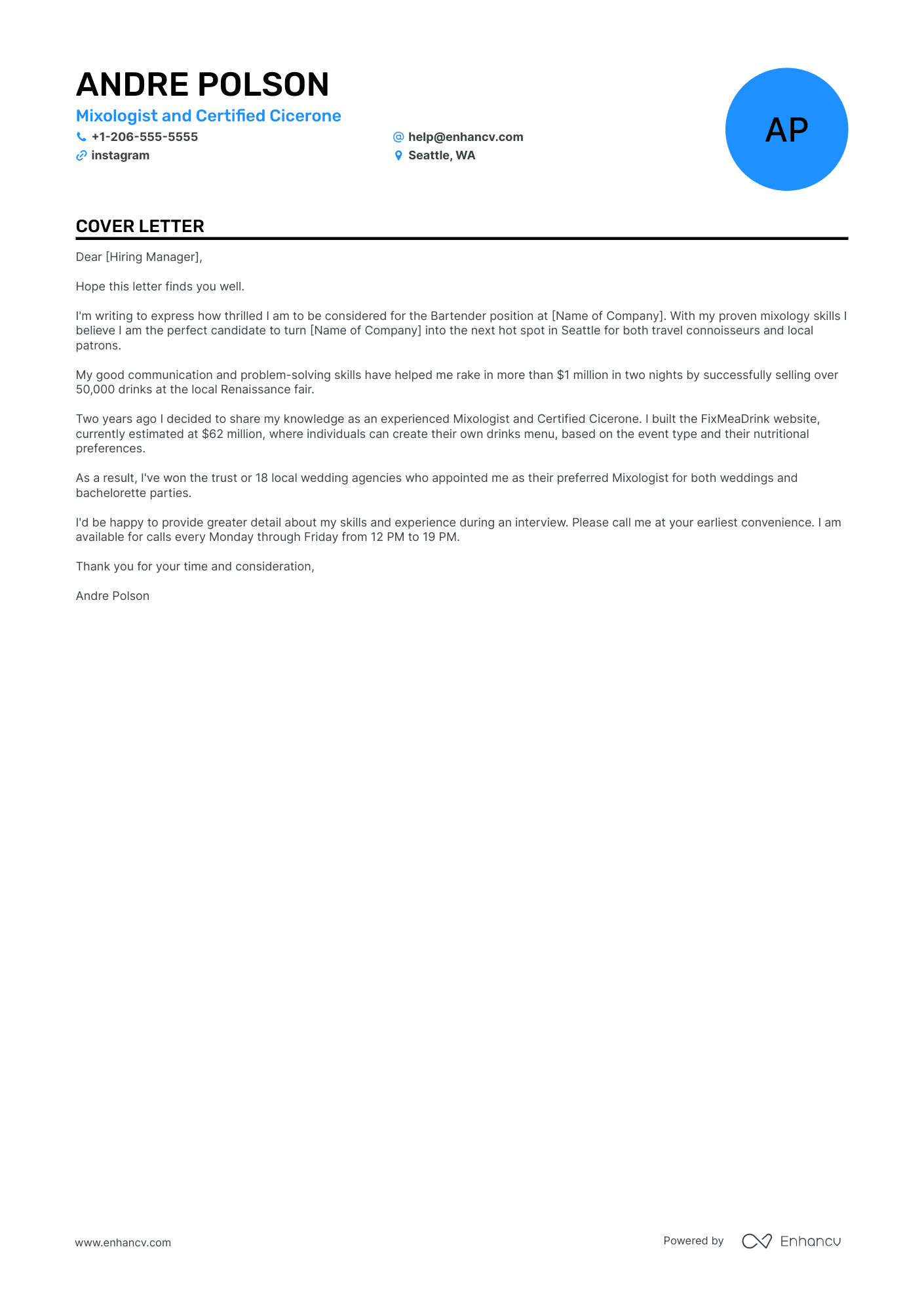Ever since you were little, you never wanted a desk job. So you set your sights on something more thrilling - bartending!
Yet, regardless how much paperwork you expect to do in the future, you still must be able to whip up a fine resume. If you want to get hired, that is.
So, how do you write a first-class Bartender resume?
This complete guide will teach you how to:
- Make sure you use the resume header to your full advantage
- Wow recruiters with your current experience, even if you’re a beginner
- Use a variety of extra sections to add character
A professional bartender is someone who can do his or her best work when he or she doesn’t feel like it…
Bruce Tomlinson, CEO of HR Wallingford Group
Choose an appropriate format for your bartender resume
Your work history and skills will determine which resume format is best for you.
Generally, if you have more than 5 years of practical experience, then you should use the reverse-chronological resume format.
Recruiters love it because this layout focuses on your career progression. And how much you’ve developed and diversified your skill set.
But if you’ve done bartending on the side and want to switch doing it full time, pick the hybrid resume format.
Its flexible layout helps showcase both your relevant experience and transferable skills.
Yet, if you’re just starting out, the functional resume format may be your best option. It lets employers know what you’re good at and you can help their business succeed.
Now, what about what’s on your resume? Let’s get into more detail.
We did a little experiment to verify how different resumes perform against various ATS tools.
It turns out that no matter the resume layout, formatting and styling are significantly more important. More specifically:
- Section Headings: ATS tools rely on the proper naming of resume sections. For instance, if you’re detailing your talents, ensure you’ve tagged the section as “Skills”.
- File Format: Our research indicates that PDFs perform better because they preserve the overall design and layout of your resume.
- Fonts: Using a distinctive font can be one way to show some flair and character on your resume. ATS systems accept most of the popular Google fonts.
- Colors and Design: The hospitality and management field can be diverse and colorful. Try to match the style of your potential employer. If it’s classy, stay classy.
- Length/Columns: Hiring managers prefer to see a concise and impactful resume. Flaunt your communication skills. Try to fit your work history within a single page.
Pro tip
Don’t let being a beginner bartender curb your enthusiasm. If you have volunteering gigs at festivals or fairs, mention it.
Even if the gig was non-paid, it’s a valuable experience which tells recruiters you can work under pressure.
Attach links to your Instagram or Pinterest in the resume header
If you first started dabbling in mixology as a hobby and you’ve recorded your story, share it in the resume header.
Whether it’s a YouTube channel or a TikTok profile, don’t hesitate to link them. The same goes for Instagram and Pinterest. Especially if you have good mood boards to display.
These will prove to recruiters that you’re always willing to learn and take pride in what you do. And they will make your resume more outstanding in the process.
At the same time, don’t forget to mention your:
- Full name
- Current or preferred job title, if you’re switching careers
- Phone number
- Address
- Professional email
- Relevant social media profiles
Once you have everything down, keep in mind to check if all the listed links work. The final result should resemble the one below:
Build a captivating Bartender resume summary
You’ve piqued recruiters’ interest, now you have to hook them in. Mix the best cocktail of experience and skills you can. Serve it in the form of a resume summary.
This is a short freeform paragraph at the top of your resume, where you can draw attention to your top achievements.
To do this, write a summary of no more than 5-6 sentences, where you detail:
- How many years of practical experience you have
- 1-2 major work accomplishments which showcase your abilities
- Technical and social talents that helped you be the bartender you are
Pay attention to how and which skills you list. ATS tools read resumes from top to bottom.
By mentioning relevant hard skills in your resume summary, you have a better chance to be picked first.
Take a look at the following examples. The first one describes the work history and achievements of a beginner bartender.
By contrast, the second one illustrates how to frame your achievements, if you’re not sure how to fit them all within the section.
Demonstrate a compelling Bartender experience section
You’ve already teased recruiters with an overview of your work experience. It’s time to prove you’re worth your salt.
Hiring managers want to see you in action. That’s why the experience section is by far the largest one on your resume.
It doesn’t matter how many entries you include in the experience section. Just remember to format them accordingly and stay relevant to the job ad. To do that, you must cite:
- Your current job title and credentials you’ve gained during your tenure, such as Certified Cicerone.
- Full name of your past employer and a one-sentence description of the company’s main business operations.
- Employment dates or the period you were involved in the particular side gig (for instance, festivals and fairs).
- The location of your former workplace.
- All the milestones you’ve achieved along the way. Keep in mind to include no more than 5 bullet points.
For each of the above-mentioned bullet points describe a different aspect of your work. But don’t just list your duties and responsibilities.
Link them to quantifiable and verifiable outcomes.
How?
Cite data and numbers. Present a challenge you were faced with and then explain how you overcame it.
For instance:
“Reduced supplies costs by 61% by reviewing the bar’s current best selling products and then re-negotiating contracts with vendors.”
Negotiation skills are difficult to measure. Yet, no company will deny that saving money is among its top priorities.
Another way to boast being able to save money is:
“Reduced work-related accidents by 30% after I rearranged the equipment behind the bar and secured a safe way to transport supplies from the storage facilities to the bar.”
The key is to put your skills and achievements in context.
We’ve prepared an excerpt from a real bartender resume to illustrate this better. Check out how Andre Polson has detailed his experience at the Night Owl Club:
- •Attracted more than 30,000 additional monthly customers by introducing a custom menu for individuals with dietary restrictions, thus increasing revenue by $750,000 per month.
- •Collaborated with the local police department by introducing a new failsafe method of reporting sexual assault attempts, thus reducing active cases by 68%.
- •Planned and executed a half-hour bartending show for the 2019 WCIT Trade Summit, which resulted in a 392% increase in inquiries for corporate parties.
- •Organized monthly Ladies Only nights where women can try new drinks and party safely. This resulted in increasing the club's popularity by 240%.
Display your education and relevant qualifications
Granted, you can become a bartender even with a highschool diploma. Still, reference your academic background. Especially if you’re switching careers.
If you have a hospitality management or food service degree, that means you have a more in-depth view of the industry. You’re not limited to bartending alone.
In essence, you have the foundation on which to grow further in the industry.
The education section is not hard to fill out. All you need to do is:
- State the name of your degree
- Name the institution, issuing the document
- List the number of years you’ve attended the course
- Mention relevant majors and minors
- Provide your GPA, if you’ve graduated recently
You can use the sample below as a reference:
Highlight your top social and technical bartender skills
The best way to tailor your resume to a specific position is to align it to the job ad. Read the descriptions very carefully.
See if you can match some of the required skills with examples of your own. It’s crucial to display how you employ your talents.
More importantly, your abilities will help you get a callback for a job interview.
How?
ATS tools vet for the hard skills listed in the job ad. Make sure you use the same naming conventions.
Chances are, recruiters have used the same spelling and formatting when fine-tuning the software.
By contrast, soft skills prove that you can fit well with the team, while attending to customers in the meantime.
Remember to create a nice blend between your social and technical talents.
With that in mind, we’ve gathered some of the most in-demand tech skills to get you started:
Must-have 24 technical skills for a bartender:
- Wine and food pairing
- Mixology
- Enology
- Knowledge about allergies and dietary restrictions
- Alcohol serving laws and standards
- HACCP guidelines
- OSHA regulations
- TIPS
- MAST
- Work area maintenance
- Catering
- Coordination and dexterity
- Ability to lift a minimum of 50 pounds
- Stamina and strength
- Ability to stand for long periods of time
- Cash handling
- POS systems
- Cash registers
- Knowledge of suppliers and stock ordering
- Safe use of cleaning equipment and supplies
- Inventory management
- Good hygiene
- Budgeting and basic math skills
- Event coordination and organization
What about your social abilities?
Everything you do matters. Soft skills are measured by the impact of your efforts. Think about the last time you did something that made a customer’s experience better.
Now take the formula you used for the experience section entries and describe your social skills. Like so:
As you can see, even if you can’t put a number on your achievements, there is still a way to show you are proactive at work.
But before you start writing, take into account what’s listed in the job description.
We asked hiring managers if there are any social skills they are always looking for in a candidate. This is what they shared:
28 trending soft skills for a bartender resume:
- Customer service
- Personability
- Communication skills
- Storytelling
- Task delegation
- Task prioritization
- Conflict resolution
- Problem solving
- Resourcefulness
- Adaptability
- Flexibility
- Enthusiasm
- Creativity
- Flair
- Leadership skills
- Team work
- Collaboration skills
- Detail-oriented
- Organizational skills
- Time management skills
- Ability to work under pressure
- Memorization skills
- Being an active listener
- Multitasking
- Process optimization skills
- Accountability
- Responsibility
- Empathetic
Show a selection of your best bartender certificates
Displaying your certificates helps not only those who are switching careers. But also industry experts who wish to point to their specialized skills.
For instance, imagine you’re a sales agent who dabbles in mixing cocktails in her spare time. You don’t have a hospitality degree, but you can flaunt your mixology certificate.
In contrast, if you do have a restaurant and bar management degree, you can point to your specialized skills by boasting a Master Cicerone certificate.
Whatever the case, don’t forget to include the:
- Name of the issuing organization
- Name of your certificate
- Dates of obtainment or expected course completion
If your certificate has an expiration date, make sure it’s valid before you add it to your resume.
9 brag-worthy bartender certificates for your resume:
- Mixology Certificate
- Certified Beer Server
- Certified Cicerone
- Advanced Cicerone
- Master Cicerone
- Beer Judge (BJCP)
- Cider Judge (BJCP)
- Mead Judge (BJCP)
- Business of Craft Beer Certificate
Expand your resume by introducing other relevant sections
There are numerous ways to make your bartender resume stand out. One method is to diversify your layout by attaching extra sections to your resume.
Note that these may differ based on how many positions you’re applying to. Stay relevant to the job ads and curate your resume accordingly.
Having this in mind, some of the most popular sections for bartenders include:
- Licenses and association memberships
- Languages (ASL, Spanish, Italian, etc.)
- Acting and improv clubs
- Hobbies and volunteering gigs
Compliment your bartender resume with a matching cover letter
Finally, if you really want to leave a lasting impression, write a convincing cover letter.
You may think this is going overboard for a bartender role. But we bet it’s something recruiters won’t expect of their candidates, too.
If you’re career hopping, this is the best way to explain your situation and boost your chances.
So, how do you write one?
Usually, cover letters are divided into three main paragraphs:
- The first one begins with a greeting to the hiring manager, responsible for reviewing candidates for the role. Then a brief overview of your top achievements follows.
- Use the second paragraph to elaborate on your talents and how you’ve applied them in real life situations. Always provide results.
- End the letter with a short statement on when and where you can be contacted for further discussions. Don’t forget to thank the recruiter for their time.
Key takeaways
- Consider your experience and choose a suitable resume format
- Link your YouTube or TikTok in the resume header, if you’ve recorded your work
- List your proudest work milestones in the resume summary
- Tie your experience to verifiable and quantifiable results
- Create a balanced mix of your key social and technical talents
- Tailor your resume by adding extra sections that make sense for the job ad
- Pair your bartender resume with compelling cover letter
Bartender resume examples
Explore additional bartender resume samples and guides and see what works for your level of experience or role.
By Experience
Entry-Level Bartender
Senior Bartender
By Role
Bar Manager
Barback
The Barback position is crucial in ensuring smooth operations in any bar setting.
Familiarity with bar operations, bar setup, resetting, and cleaning tends to emerge from hands-on experience in a fast-paced environment.
In your resume, showcase any experience involving close cooperation with bartenders, proactivity in restocking supplies and ingredients, and maintaining cleanliness.
Demonstrate adaptability to quick changes and your ability to multitask.
Prioritize your skills that directly impacted the service.
Many successful Barbacks are physically strong and adept at maintaining cleanliness – having these skills can set you apart.
Include any attributes that positively affected the service, such as reliability, efficiency, and being a good team player.
Rather than merely listing your skills, express how they contributed to improved service or streamlined operations, like 'Improved restocking procedure by implementing...', 'Increased cleaning efficiency by...'.
Use the 'Skill-Action-Result' format for maximum impact.
Bartender Server
Being a Bartender Server requires providing a comprehensive service experience, combining bar operation expertise with customer service skills.
Familiarity with drink recipes, menu presentation, and point-of-sale systems often come from prior hospitality experience.
When applying, emphasize abilities that streamline workflow in a high-volume environment such as familiarity with types of drinks, menu knowledge, and using point-of-sale systems.
Demonstrate your capacity for handling customer requests and maintaining customer satisfaction, proving your potential as an exceptional Bartender Server.
Highlight practical skills that have a direct impact on service, such as speed, efficiency, and an excellent memory for orders and faces, proving the service's effectiveness.
Don't merely list your skills; show how they enhanced service delivery. For example, 'improved customer tip frequency by….' or 'enhanced regular customer base through….'
Stick to the 'Skill-Action-Result' approach.
